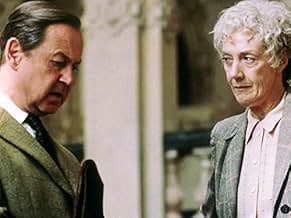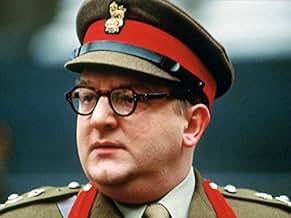Anthony Powell's twelve volume novel sequence "A Dance to the Music of Time" has been dramatized for television.Anthony Powell's twelve volume novel sequence "A Dance to the Music of Time" has been dramatized for television.Anthony Powell's twelve volume novel sequence "A Dance to the Music of Time" has been dramatized for television.
- Won 1 BAFTA Award
- 3 wins & 5 nominations total
Browse episodes
Featured reviews
At long last, Anthony Powell's 12 volume novel sequence A Dance to the Music of Time has been dramatised for television. If Powell's "Journals" are to be believed, this is after any number of false starts spanning the best part of 20 years. The dramatisation was in four two-hour episodes, each covering approximately 3 books. They were shown on UK's Channel 4 TV in October 1997. The format of four 2-hour films was, in many ways, unfortunate as it severely constrained the amount of the action which could be shown, however given the exigencies of modern TV scheduling it was probably the only way in which "Dance" was ever going to get televised. As a devotee of the books, I was apprehensive about how they would translate into film. Just how do you condense 12 novels into 8 hours of television? However in my view the dramatisation worked extremely well, notwithstanding the necessary omissions. What helped the whole production was some interesting, and at times inspired and doubtless extravagant, casting which included: Edward Fox (as Uncle Giles), Zoë Wanamaker (as Audrey Maclintick), John Gielgud (as St John Clarke), Alan Bennett (as Sillery), Miranda Richardson (as Pamela Flitton)... some interesting choices!! Overall an interesting and enjoyable series. I just fear that having been done once that we'll never see "Dance" recreated in a different (better?) format and that Powell will remain relatively unknown in comparison with contemporaries like Evelyn Waugh ... which is in my view quite unjustifiable as Powell is a much better writer. Fortunately Channel 4 released these 4 films on video - which is excellent as they're well worth watching again.
It's possibly a bit late to post this question but as I have only now managed to see the video, here goes anyway. Does anyone know WHY it was deemed necessary to replace James Purefoy and Emma Fielding as Nicholas Jenkins and his wife in the last film of the series? Most of the other characters were left to age, convincingly or otherwise, even Widmerpool himself. Though Joanna David did at least bear a tolerable resemblance to how Isobel (Fielding) might have looked in later life, John Standing, excellent actor though he is, didn't look remotely like an aged James Purefoy. The changeover broke the continuum of events for me and was a constant source of irritation. What was behind this strange, irrational decision?
They don't make adaptations like this any more - no doubt for cost reasons and a lack of imagination and bravery at the TV companies. 7 hours of solid drama, yet full of incidental humour and some very fine characterisations.
Unfortunately it is flawed, and the flaws make it just very good viewing rather than the excellent series it should have been. The biggest flaws to my mind are:
1 The decision to replace Nick and his wife by new actors for Film 4 was totally wrong. Nick ages far too much in too short a space of time, and looks completely different. This creates a real problem of believability.
2 Still on ageing, some of the actors are 'aged' very well, whilst others (especially the ladies and Odo) seem hardly any different as the decades progress.
3 Film 4 is by far the weakest, though to be fair this reflects the books on which it is based. Perhaps it should have been cut further and the earlier years given even greater prominence.
4 Despite a great deal of pruning, there are still too many characters and insufficient narration for non-aficionados of the books to be sure all the time of who is who.
5 The scenes often seem to be a succession of dramatic deaths - difficult to avoid with the way the story has to be condensed, but very predictable nonetheless.
However, it's still pretty good, and light years removed from much of the dumbed-down drama on TV today.
Unfortunately it is flawed, and the flaws make it just very good viewing rather than the excellent series it should have been. The biggest flaws to my mind are:
1 The decision to replace Nick and his wife by new actors for Film 4 was totally wrong. Nick ages far too much in too short a space of time, and looks completely different. This creates a real problem of believability.
2 Still on ageing, some of the actors are 'aged' very well, whilst others (especially the ladies and Odo) seem hardly any different as the decades progress.
3 Film 4 is by far the weakest, though to be fair this reflects the books on which it is based. Perhaps it should have been cut further and the earlier years given even greater prominence.
4 Despite a great deal of pruning, there are still too many characters and insufficient narration for non-aficionados of the books to be sure all the time of who is who.
5 The scenes often seem to be a succession of dramatic deaths - difficult to avoid with the way the story has to be condensed, but very predictable nonetheless.
However, it's still pretty good, and light years removed from much of the dumbed-down drama on TV today.
This television adaptation, by Hugh Whitmore, of Anthony Powell's twelve-volume book condenses all the action of five decades, and over a hundred characters, into eight hours. We first meet the main characters Nick Jenkins, our constant narrator; Kenneth Widmerpool; Charles Stringham; and Peter Templar when they are at school together. Through the years we watch them move through their tangled lives, which end in tragedy for some, happiness for others.
Making an impact within the cast are James Purefoy as Nick Jenkins (playing him from university to the end of World War II); Jonathan Cake as Peter Templar; Claire Skinner as Jean Duport; Grant Thatcher as Mark Members; James Fleet as Hugh Moreland; Zoë Wanamaker as Audrey MacLintock; John Gielgud as St John Clarke; Miranda Richardson as Pamela Fritton; David Yelland as Jenkins' father; Edward Fox as Uncle Giles; and Michael Williams as Ted Jeavons.
But the best performance within this series by a mile is from the wonderful Simon Russell-Beale, managing to turn the truly horrible Widmerpool into a rounded character who is totally convincing, whether as a figure of fun at school, as a pompous major in the war, as a humiliated husband, or as a free spirit dancing.
One little quibble would be why did they suddenly change the casting for Nick Jenkins and no other main character in the final episode? J C Quiggin, Odo Stephens, Mark Members, Widmerpool and others remain the same actors made up to look older. Jean and Isabel (Mrs Jenkins) are also recast but this isn't as noticeable. So, after two and a half episodes getting used to James Purefoy as Nick we suddenly have to adapt to John Standing. He's effective, but I think this change was a mistake.
So, is this adaptation any good? It is true that sometimes you lose track of who's who (who they were related to, who they married, where they met) but there are numerous scenes of interest not all directly witnessed by Nick. The musical soundtrack is superb and well-chosen. Having eight hours to tell the story means that things don't have to progress at a breakneck pace, and if some aspects come off better than others, nothing really fails. Dance to the Music of Time' is an engrossing and superior piece of TV drama.
Making an impact within the cast are James Purefoy as Nick Jenkins (playing him from university to the end of World War II); Jonathan Cake as Peter Templar; Claire Skinner as Jean Duport; Grant Thatcher as Mark Members; James Fleet as Hugh Moreland; Zoë Wanamaker as Audrey MacLintock; John Gielgud as St John Clarke; Miranda Richardson as Pamela Fritton; David Yelland as Jenkins' father; Edward Fox as Uncle Giles; and Michael Williams as Ted Jeavons.
But the best performance within this series by a mile is from the wonderful Simon Russell-Beale, managing to turn the truly horrible Widmerpool into a rounded character who is totally convincing, whether as a figure of fun at school, as a pompous major in the war, as a humiliated husband, or as a free spirit dancing.
One little quibble would be why did they suddenly change the casting for Nick Jenkins and no other main character in the final episode? J C Quiggin, Odo Stephens, Mark Members, Widmerpool and others remain the same actors made up to look older. Jean and Isabel (Mrs Jenkins) are also recast but this isn't as noticeable. So, after two and a half episodes getting used to James Purefoy as Nick we suddenly have to adapt to John Standing. He's effective, but I think this change was a mistake.
So, is this adaptation any good? It is true that sometimes you lose track of who's who (who they were related to, who they married, where they met) but there are numerous scenes of interest not all directly witnessed by Nick. The musical soundtrack is superb and well-chosen. Having eight hours to tell the story means that things don't have to progress at a breakneck pace, and if some aspects come off better than others, nothing really fails. Dance to the Music of Time' is an engrossing and superior piece of TV drama.
Hands down, this is the best miniseries or film that I have ever seen. Everything about this miniseries was my cup of tea: the clothes, the scenery, the dialogue, the many handsome actors, just everything. I had broken down and bought myself one of those PAL video players as so many video tapes that I wanted to see were only available in PAL format. As an American NTSC videotape user, it was hard for me to reconcile the purchase of the special PAL VCR, until I saw this miniseries in all its glory. What an absolute confection! I wanted to be a part of the story. I find it hard to believe that this miniseries is not available to the American market in NTSC format. This miniseries far surpasses Brideshead Revisited, among others. Although Simon Russell Beal certainly did a phenomenal acting job, I also thought James Purefoy displayed alot of range and depth particularly in the difficult role of an observer narrator. I really can't say enough about how marvelous this miniseries was! It was worth every penny spent to see this miniseries!
Did you know
- GoofsIn the final segment, when Widmerpool is kissing the feet of the disciples, the edge of his phony hairpiece is clearly visible on the back of his head.
- How many seasons does A Dance to the Music of Time have?Powered by Alexa
Details
- Release date
- Country of origin
- Language
- Also known as
- Una danza para la música del tiempo
- Filming locations
- Production companies
- See more company credits at IMDbPro
Contribute to this page
Suggest an edit or add missing content











































